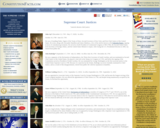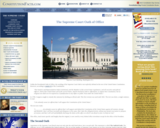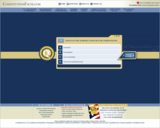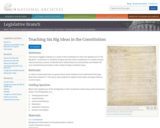
Informatinon about well-known Supremem Court justices
- Subject:
- History
- Social Science
- Social Studies
- Material Type:
- Reading
- Provider:
- ConstitutionFacts.com
- Date Added:
- 01/03/2023

Informatinon about well-known Supremem Court justices

Unlike the Presidential Oath of Office, the wording of the Supreme Court Oath is not explicitly defined in the text of the United States Constitution. Learn more on this webpage.

Take the Constitution quiz to find out how much you know about the Constitution of the United States of America.

How has the Supreme Court decided cases in controversies related to the Bill of Rights? Students will examine how the Supreme Court has decided landmark cases related to the Bill of Rights.

These activities introduce students, teachers, and families to some of the history and symbolism featured at the Supreme Court of the United States. Recommended for grades 5-12. Downloadable PDFs are available.

The coloring book pages below highlight aspects of Court history and tradition along with some of the notable artworks and architectural features of the interior and exterior of the Supreme Court Building. We hope you have fun coloring while learning about the Court!

Test your detection skills and learn about Chief Justice John Marshall. See if you can find 9 differences between Rembrandt Peale’s portrait of Chief Justice John Marshall and a modified version.

Lions are part of the decoration in the Great Hall. See if you can find 9 differences between two cartoons inspired by the carved marble lions in the Great Hall Frieze.

Recommended for grades K-4. Learn about and explore the Supreme Court Building with cartoon tortoise, Lex, as your guide.

Look closely and take in the East and West Pediments, the Fraser statues flanking the front steps, the Bronze Doors, flagpoles, lampposts, and perimeter medallions.

Explore the highlights of the ground and first floors of the Supreme Court Building, including the John Marshall statue, spiral staircases, Great Hall, and Courtroom.

Overview of the 6 big ideas that animate the Constitution: limited government, republicanism, chdecks and balances, federalism, separation of powers, popular sovereignty

"Teaching 9/11 and the Constitution: Free Speech and Civil Liberties" featured First Amendment scholar David Hudson of Belmont University, who spoke about the constitutional issues surrounding the federal government's reaction to the 9/11 attacks, including the Patriot Act. Jennifer Lagasse, Assistant Director of Education Programs at the 9/11 Memorial & Museum, demonstrated free educational resources that support teachers in both commemorating the milestone 20th anniversary of the attacks and teaching about their enduring repercussions for a generation with no memory of the event. Maria Gallo, Director of Professional Development & Special Programs for the Center for Civic Education, explained a new lesson related to 9/11 and the Constitution for high school teachers.

How a country responds to a national crisis reveals a lot about its people and their governments. American responses to the Covid-19 pandemic of 2020 provide just such a window revealing issues of federalism, separation of powers, and civil liberties. This webinar series, "Teaching in Realtime: How Well Does the American Federal System Respond to Public Health Crises?" was presented by Stephen Schechter, professor emeritus at Russell Sage College and Thomas Vontz, professor and director of the Center for Social Studies Education at Kansas State University in June and July 2020. This series was sponsored by Kansas State University, the Johnson County First Amendment Foundation, and the Center for Civic Education.
A webinar series presented by Stephen Schechter, professor emeritus at Russell Sage College and Thomas Vontz, professor and director of the Center for Social Studies Education at Kansas State University. It is provided as a public service of Kansas State University's Center for Social Studies Education, the Center for Civic Education, and the Johnson County First Amendment Foundation.
Duration: 1 hour, 30 minutes

How a country responds to a national crisis reveals a lot about its people and their governments. American responses to the Covid-19 pandemic of 2020 provide just such a window revealing issues of federalism, separation of powers, and civil liberties. This webinar series, "Teaching in Realtime: How Well Does the American Federal System Respond to Public Health Crises?" was presented by Stephen Schechter, professor emeritus at Russell Sage College and Thomas Vontz, professor and director of the Center for Social Studies Education at Kansas State University in June and July 2020. This series was sponsored by Kansas State University, the Johnson County First Amendment Foundation, and the Center for Civic Education.
How a country responds to a national crisis reveals a lot about its people and their governments. American responses to the Covid-19 pandemic of 2020 provide just such a window revealing issues of federalism, separation of powers, and civil liberties. "Teaching in Realtime: How Well Does the American Federal System Respond to Public Health Crises?" is a webinar presented by Stephen Schechter, professor emeritus at Russell Sage College, Thomas Vontz, professor and director of the Center for Social Studies Education at Kansas State University. This webinar is sponsored by Kansas State University, the Johnson County First Amendment Foundation, and the Center for Civic Education.
Duration: 1 hour, 32 minutes

How a country responds to a national crisis reveals a lot about its people and their governments. American responses to the Covid-19 pandemic of 2020 provide just such a window revealing issues of federalism, separation of powers, and civil liberties. This webinar series, "Teaching in Realtime: How Well Does the American Federal System Respond to Public Health Crises?" was presented by Stephen Schechter, professor emeritus at Russell Sage College and Thomas Vontz, professor and director of the Center for Social Studies Education at Kansas State University in June and July 2020. This series was sponsored by Kansas State University, the Johnson County First Amendment Foundation, and the Center for Civic Education.
This is the third class in the four-part webinar series, "Teaching in Realtime: How Well Does the American Federal System Respond to Public Health Crises?" presented by Stephen Schechter, professor emeritus at Russell Sage College, and Thomas Vontz, professor and director of the Center for Social Studies Education at Kansas State University. This webinar is sponsored by Kansas State University, the Johnson County First Amendment Foundation, and the Center for Civic Education.
Duration: 1 hour, 41 minutes

How a country responds to a national crisis reveals a lot about its people and their governments. American responses to the Covid-19 pandemic of 2020 provide just such a window revealing issues of federalism, separation of powers, and civil liberties. This webinar series, "Teaching in Realtime: How Well Does the American Federal System Respond to Public Health Crises?" was presented by Stephen Schechter, professor emeritus at Russell Sage College and Thomas Vontz, professor and director of the Center for Social Studies Education at Kansas State University in June and July 2020. This series was sponsored by Kansas State University, the Johnson County First Amendment Foundation, and the Center for Civic Education.
This is the fourth and final class in the webinar series, "Teaching in Realtime: How Well Does the American Federal System Respond to Public Health Crises?" presented by Stephen Schechter, professor emeritus at Russell Sage College, and Thomas Vontz, professor and director of the Center for Social Studies Education at Kansas State University. This webinar is sponsored by Kansas State University, the Johnson County First Amendment Foundation, and the Center for Civic Education.
Duration: 1 hour, 33 minutes

In a series of three brief clips, Larry Kramer, Dean of Stanford Law School, provides some insights into understanding and teaching various details of the constitution.

In Tennessee v. Garner (1985), the Supreme Court ruled that under the Fourth Amendment, a police officer may not use deadly force against a fleeing, unarmed suspect. The fact that a suspect does not respond to commands to halt does not authorize an officer to shoot the suspect, if the officer reasonably believes that the suspect is unarmed.

Terry v. Ohio (1968) asked the United States Supreme Court to determine the legality of stop-and-frisk, a police practice in which officers would stop passersby on the street and inspect them for illegal contraband. The Supreme Court found the practice was legal under the Fourth Amendment, if the officer could show he had a "reasonable suspicion" that the suspect was armed and dangerous.